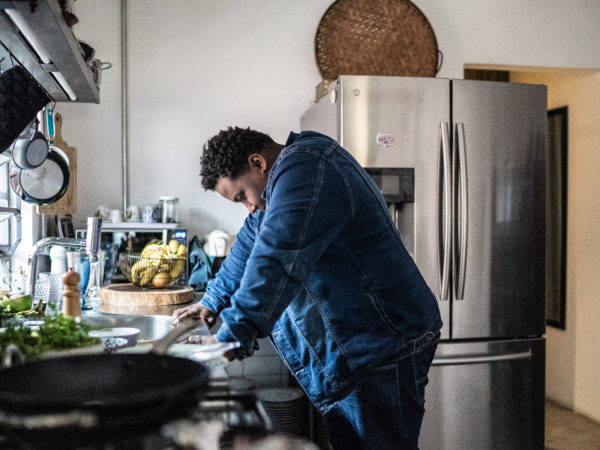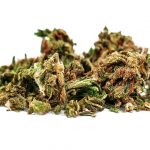Can Cannabis Increase Anxiety?
I’ve always heard that cannabis was a potential treatment for anxiety – but is it true that regular use could actually increase anxiety?
Andrew Weil, M.D. | October 24, 2024

Cannabis has been used for thousands of years, with its various components making their way into ropes, clothing, oils, and healing products. As Western medicine catches up to what traditional medicine has known for millennia, we are finding evidence that the components of cannabis may be helpful for a wide range of conditions. It affects people differently, however, and it also has complex chemistry, with constituents varying from strain to strain and even from plant to plant. Depending on what product is being used, how it’s being taken, and who’s using it, it may ease anxiety, cause it, or make it worse.
Cannabis sativa contains many compounds. The main psychoactive one – delta-9-tetrahydrocannabinol (THC) – generally elicits feelings of relaxation and euphoria, but in high concentrations it can trigger anxiety, paranoia, and panic. Cannabis also contains cannabidiol (CBD), which is not considered psychoactive and is often used to reduce anxiety. Whether or not cannabis increases or decreases anxiety in any particular individual may depend on the balance of those compounds.
Cannabis products contain varying amounts of THC, but in general, today’s strains have much higher concentrations of it than those of a few decades ago. Individuals who use cannabis products that are high in THC, especially if they don’t use the products often, may find themselves experiencing increased negative effects.
One troubling study looked at cannabis-related emergency department visits in Ontario, Canada, over an eleven-year period. Of nearly 35,000 individuals with no prior history of anxiety who had a cannabis-related emergency, more than 12 percent (4,294 people) required treatment for an anxiety related concern within three years. That’s 3.7 times the risk of the general population.
A related study looked at a similar pool of patients through the lens of legalization – as cannabis use patterns change along with laws, researchers looked at whether or not legalization affected anxiety disorders. Over a 14-year period, during which cannabis became legal in more jurisdictions in Canada, the study found large increases in anxiety-related emergency visits that involved cannabis use. Researchers noted that the results may suggest either cannabis causing anxiety or more people with anxiety using cannabis to try to manage it. It is a concerning association in either case.
A small but more hopeful study from Johns Hopkins found that d-limonene, an aromatic component of cannabis, lessens the potentially negative effects of THC. Twenty subjects performed nine tests, including taking THC alone, d-limonene alone, and the two in combination, in addition to a placebo session. Those who consumed THC alone reported typical anxious effects, which were significantly lessened in those who used the combination of THC and d-limonene. This is more evidence that the THC in cannabis is what can cause anxiety; moderating the THC, or reducing its concentration, may help reduce this risk.
The evidence is compelling that CBD can be effective against anxiety, and there are many products available — edibles, oils, even bath products — that have either no THC or extremely low concentrations of it. They could provide the anti-anxiety benefits of CBD without the anxiety-provoking effects of THC. There is currently a confusing mix of federal and state laws governing cannabis-derived products, including CBD, so check your state laws.
Andrew Weil, M.D.
Sources
Sharpe L, Sinclair J, Kramer A, de Manincor M, Sarris J. Cannabis, a cause for anxiety? A critical appraisal of the anxiogenic and anxiolytic properties. J Transl Med. 2020 Oct 2;18(1):374. doi: 10.1186/s12967-020-02518-2. PMID: 33008420; PMCID: PMC7531079. ncbi.nlm.nih/pmc/articles/PMC7531079/
Han K, Wang JY, Wang PY, Peng YC. Therapeutic potential of cannabidiol (CBD) in anxiety disorders: A systematic review and meta-analysis. Psychiatry Res. 2024 Sep;339:116049. doi: 10.1016/j.psychres.2024.116049. Epub 2024 Jun 21. PMID: 38924898. pubmed.ncbi.nlm.nih/38924898/
Myran DT, Harrison LD, Pugliese M, Tanuseputro P, Gaudreault A, Fiedorowicz JG, Solmi M. Development of an anxiety disorder following an emergency department visit due to cannabis use: a population-based cohort study. EClinicalMedicine. 2024 Feb 5;69:102455. doi: 10.1016/j.eclinm.2024.102455. PMID: 38544799; PMCID: PMC10965401. pubmed.ncbi.nlm.nih/38544799/
McCarthy SDS, Xiao J, Pugliese M, Perrault-Sequeira L, Myran DT. Changes in cannabis involvement in emergency department visits for anxiety disorders after cannabis legalization: a repeated cross-sectional study. Lancet Reg Health Am. 2024 Jun 13;36:100815. doi: 10.1016/j.lana.2024.100815. Erratum in: Lancet Reg Health Am. 2024 Aug 03;37:100857. doi: 10.1016/j.lana.2024.100857. PMID: 38974381; PMCID: PMC11225812. pubmed.ncbi.nlm.nih/38974381/
Song Y, Seo S, Lamichhane S, Seo J, Hong JT, Cha HJ, Yun J. Limonene has anti-anxiety activity via adenosine A2A receptor-mediated regulation of dopaminergic and GABAergic neuronal function in the striatum. Phytomedicine. 2021 Mar;83:153474. doi: 10.1016/j.phymed.2021.153474. Epub 2021 Jan 21. PMID: 33548867. pubmed.ncbi.nlm.nih/33548867/
Spindle TR, Zamarripa CA, Russo E, Pollak L, Bigelow G, Ward AM, Tompson B, Sempio C, Shokati T, Klawitter J, Christians U, Vandrey R. Vaporized D-limonene selectively mitigates the acute anxiogenic effects of Δ9-tetrahydrocannabinol in healthy adults who intermittently use cannabis. Drug Alcohol Depend. 2024 Apr 1;257:111267. doi: 10.1016/j.drugalcdep.2024.111267. Epub 2024 Mar 13. PMID: 38498958; PMCID: PMC11031290. pubmed.ncbi.nlm.nih/38498958/












